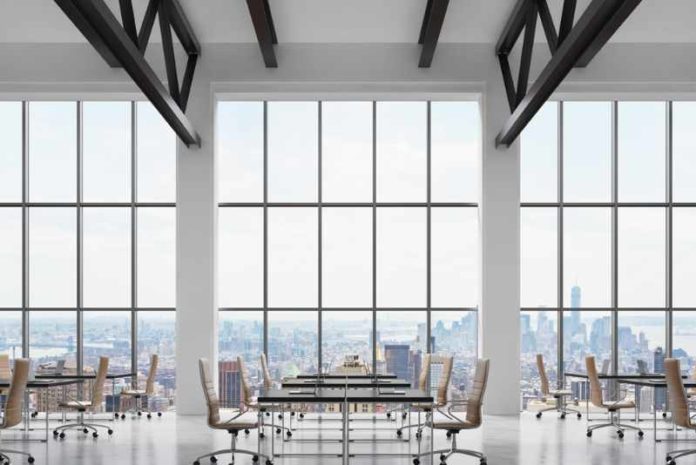Whether you’re a startup or expanding small business, chances are you’ve heard of the open floor concept. Over the past decade, the open floor plan concept has dominated workspaces, promising better collaboration, improved work culture, and creativity cultivation.
By Michael Zhou
This office landscape is fully built upon the premise of communication and innovation. The whole idea was to eliminate the soulless cubicle in favor of an energized office space sans privacy, where everyone was on the same level—from management to interns.
A study conducted in 2010 found that 68% of people worked in an office with no cubicles or low-walled cubicles. Since then, that number has continued to explode. But as a business owner, you need to do what’s best for your team. A happy office is necessary for growth. Although the open floor plan is trending, you should do your research to determine what’s best for your business. Here’s what you should know:
The Open Plan Myth
Since the open office trend emerged, it’s been met with some criticism. For starters, studies have shown that it’s not as conducive to productivity and collaboration as we might think. According to a recent study published by Harvard Business School, open floor plans actually reduce face-to-face interactions by 70% and increase interoffice email exchanges by 50%. With these statistics in mind, the idea that they promote collaboration turns out to be more of a myth than anything.
Other studies have shown that these open floor spaces actually increase workplace stress. With half the American population considering themselves as introverts, open floor plans actually cause more anxiety, which thwarts their ability to perform efficiently and decreases workplaces happiness. Distraction is another big issue. Too much visual stimulation can affect the community quality of life. It can be very frustrating to focus on tasks and think creatively when you’re surrounded by others and can be interrupted easily.
The fact is, people enjoy privacy. According to a survey conducted by YouGov, 31% of surveyed individuals who work in an open office floor plan admitted that they held back their true thoughts and feelings during work calls or discussions because they didn’t want to be judged by coworkers who could overhear them. Even more: 13% of people said they would give up their end-of-year bonuses in exchange for more privacy, and 27% would give up their office’s coffee machine.
A Compromising Solution
Although there is plenty of research to suggest that open office floor plans aren’t for every office—and can do more harm than good—it’s still worth noting that there are ways to capitalize on the positive aspects of open design. Open floor plans, for example, can be a great way to promote interaction within a team and think of new ideas, but horrible at creating a suitable environment for those team members to execute those ideas. Today, a flexible office space is likely a fair compromise.
“More modern cubicles create a viable solution for those who want the benefits of an open space without compromising privacy. Low walled office cubicles are gaining popularity, and for good reasons,” says ROSI Inc, a Houston provider of office furniture. “A low walled cubicle helps bring in that extra lights without the feeling of being too close or cluttered by people around you. These walls are low enough to make collaboration easy, but high enough to incorporate separation.”
On-demand private spaces also help employees who need privacy for specific reasons, like a conference call. Private offices or phone booth rooms allow employees to handle private calls and meetings in a way that’s best for them. You can also allow your staff to book rooms when they’re working on specific projects that require a higher level of concentration and privacy.
And lastly, consider implementing a remote work program that allows your team members to opt for certain days at home. Allowing your staff to work from home every now and then could actually improve productivity, build trust, and increase overall happiness and workplace culture. After all, who doesn’t love some autonomy? Even more, remote work can actually save your company money.
Michael Zhou is a Senior VP of Business Intelligence Development and has assisted the Fortune 1000 company with expertise in the web as a whole, including ground-zero marketing efforts that benefit both consumer and vendor. He is also contributor on Esprittoday.
Open floor stock photo by ImageFlow/Shutterstock







